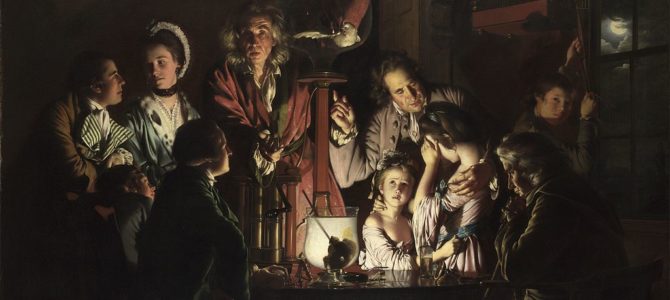
Jonah Goldberg has a new book out defending the “liberal”—i.e., pro-freedom—legacy of the Enlightenment, the philosophical awakening of the eighteenth century. Such a defense is certainly needed in light of the Enlightenment’s wholesale rejection by today’s mainstream intellectuals.
Yet this has required many others on the Right to come to terms with their views of the Enlightenment, and it’s not going well. Many conservatives are dismissing the Enlightenment and trying to hand over its legacy to the anti-Enlightenment intellectuals on the Left.
My Federalist colleague John Davidson sums up Goldberg’s view of the Enlightenment.
Goldberg calls the emergence of the liberal order ‘the Miracle,’ because we can’t exactly account for why it emerged about 300 years ago. Given the sweep of evolutionary history, he says, the material progress of the past three centuries is not natural: ‘The natural state of mankind is grinding poverty punctuated by horrific violence terminating with an early death.’
But something happened to disrupt the natural state of mankind. ‘Around the year 1700, in a corner of the Eurasian landmass, humanity stumbled into a new way of organizing society and thinking about the world,’ writes Goldberg. ‘It was as if the great parade of humanity had started walking through a portal to a different world.’
Davidson then offers this critique:
Yes, the Miracle gave us capitalism and democracy, but it also gave us hyper-individualism, scientism, and communism. It gave us liberty and universal suffrage, but it also gave us abortion, euthanasia, and transgenderism. The abolition of man [a reference to C.S. Lewis’s critiques] was written into the Enlightenment, in other words, and the suicide of the West that Goldberg warns us about isn’t really a suicide at all, because it isn’t really a choice: we aren’t committing suicide, we’re dying of natural causes.
It’s quite a trick for the Enlightenment to bring us both hyper-individualism and communism, but more on that in a moment. Davidson goes on to assert that “the various illiberal ideologies that came out of Enlightenment thought (like communism)” are a “natural consequence of the hyper-rational scientism embedded in the liberal order itself.”
He quotes another review by Richard M. Reinsch II: “If you are going to set the Enlightenment Miracle as the standard of human excellence, one that we are losing, you must also clearly state the dialectic it introduces of an exaltation of reason, power, and science that can become something rather illiberal.” Reinsch concludes that “scientistic communist thinking” cannot be “cleaved from the modern Enlightenment project.”
Well, thanks, guys. You just took the entire moral and intellectual authority of the Enlightenment and handed it over to the commies, a feat they could never have managed on their own.
This is the big mistake of American conservatism, its original sin. In an attempt to reassert the role of religion in American society, they grant to the Left the status of defenders of reason and freedom and describe them as the inheritors of the Enlightenment.
This is particularly awful because the Enlightenment does carry a great deal of moral and intellectual authority—a reputation it has thoroughly earned by its spectacular results in bettering the human condition. It should not be necessary to rehearse any of that here, except to note that the scope of its advance is both material and spiritual: a vast and universal explosion of wealth for which there is no historical comparison; scientific advances that have doubled human life expectancy and improved the quality of life; a flowering of political and intellectual freedom; the achievement of near-universal literacy and basic education far beyond any previous era; a vast expansion in institutions of learning, research, and culture—yes, even today—and in the leisure time to enjoy their results; a decrease in levels of violence within societies; and, after the bloody death throes of twentieth-century totalitarianism, finally a precipitous decrease in war and deaths from war. These are just the highlights.
One might offer a few cavils about the discontents of the current age, but they seem pathetically minor compared to such a spectacular advance. The only proper response is to try to understand how all of this happened and how it can be preserved and extended, not to dismiss it as some kind of false paradise. The worst response is to hand over this brilliant legacy to its deadly enemies.
I don’t know how Goldberg deals with this in his book, but we shouldn’t need him to teach us about the achievements of the Enlightenment and how Enlightenment thinkers helped create the pillars of civilization that we seek to defend today.
Historians debate this sort of thing—at the beginning of the Enlightenment, nobody announced, “This is the Enlightenment,” and the term didn’t come into use in English until long after it was over—but I would date the beginning of the Enlightenment to somewhere around 1689. Isaac Newton’s Principia Mathematica, a breakthrough in scientific understand of the natural world, had been published two years earlier, and at the end of 1689 Newton’s friend John Locke published his Two Treatises of Government, which set forth the basic political theory of individual rights and the consent of the governed. A friend of Locke’s also published his Letter Concerning Toleration, which made the case for freedom of speech and religious freedom.
I would end the Enlightenment somewhere around 1789. By then, Thomas Jefferson had written the Declaration of Independence, Adam Smith had written The Wealth of Nations, and James Watt had invented his steam engine. These events helped establish the key legacies of the Enlightenment: representative government, free markets, and the Industrial Revolution. From those achievements flow all of the past two centuries’ radical improvements in the human condition.
Against that, the critics of the Enlightenment have—what? The French Revolution. That’s the other reason I take 1789 as the cutoff. That year marks the ratification of the U.S. Constitution and the storming of the Bastille, events that would define the best and worst outcomes of the era: freedom and prosperity on the one hand, terror and war on the other.
But taking the French Revolution as an example of the evils of the Enlightenment runs into a major problem. The most influential philosopher among the French revolutionaries was Jean-Jacques Rousseau. He was certainly the dominant intellectual influence on the Montagnard or “Mountain” faction of the Jacobins, so named because they took the highest seats at the far left of the French legislative chamber—which also makes them the original “leftists.”
Rousseau was a man of the Enlightenment in the chronological sense, living smack dab in the middle of the eighteenth century. But he is usually considered a critic of the Enlightenment. He made his name in 1750 with his Discourse on the Arts and Sciences. This was Rousseau’s entry in an essay contest on the question, “Has the restoration of the sciences and arts”—meaning the Renaissance—”contributed to the purification of morals?” He answered with an unambiguous “no.” His whole argument was that man was better off as a “noble savage” living in tribes, and that civilization corrupted men and made them worse off.
So if you’re looking for someone to represent what Reinsch describes as the “exaltation of reason and…science,” maybe pick Newton, but Rousseau is not your man. It is telling that in literature, Rousseau is considered a forerunner of Romanticism, with its emphasis on subjectivity and emotionalism in very pointed opposition to Enlightenment rationality. Ironically, the Romantics’ critique of the Enlightenment—in one summary, that “excessive dependence on reason…disregarded the bonds of history, myth, faith, and tradition that were necessary to hold society together”—is reflected in the criticisms of the Enlightenment offered by today’s conservatives.
In politics, the effect of Rousseau’s ideas—see a good overview of his influence on Robespierre and the other Montagnards—was to reject Locke’s theory of individual rights in favor of the collectivist idea of a “general will,” with which everyone must be forced to agree. “Whoever refused to obey the general will shall be constrained to do so by the whole body [of society]; which means nothing else than that he shall be forced to be free.” This is the root of the twentieth-century “liberal” who tries to sell us coercion under the guise of freedom.
Then we come to the Communists, and here’s what Rousseau had to say:
The first man who, having fenced in a piece of land, said, ‘This is mine,’ and found people naïve enough to believe him, that man was the true founder of civil society. From how many crimes, wars, and murders, from how many horrors and misfortunes might not any one have saved mankind, by pulling up the stakes, or filling up the ditch, and crying to his fellows: Beware of listening to this impostor; you are undone if you once forget that the fruits of the earth belong to us all, and the earth itself to nobody.
So yes, Communism and other disastrous totalitarian doctrines had roots in the eighteenth cntury (and earlier). But their chief source was a critic of the Enlightenment who was at odds with the dominant intellectual achievements of the era.
The Left’s philosophical and political origins lie in a rebellion against the Enlightenment and its signature achievements. They rejected freedom, they rejected individual rights, they rejected individualism and rationality—and anyone who thinks Communism is “scientific” should reflect that no scientific movement would conduct two centuries of “experiments,” see all of them fail, and still stubbornly refuse to accept the results.
To be sure, there are those on the Left who still try to steal the prestige of the Enlightenment, who engage in loud propaganda about being “liberals” and about being the “party of science,” and they can always rely on the philosophical gullibility of conservatives to help them perpetrate this fraud. But why should Rousseau’s doctrines represent “the Enlightenment” in the minds of the Right, rather than the ideas of Locke and Jefferson?
The Enlightenment was not perfect. It suffered from philosophical confusions, errors, and omissions, weak spots that made it possible for two centuries of critics on both the Left and Right to undermine it. We need to work on understanding the foundations of the Enlightenment’s achievements, strengthening them, improving them, and building upon them. But first we should start with some gratitude, and maybe even a little awe, for an intellectual movement that accomplished so much for humanity.
Robert Tracinski is a senior writer for The Federalist. His work can also be found at The Tracinski Letter.









